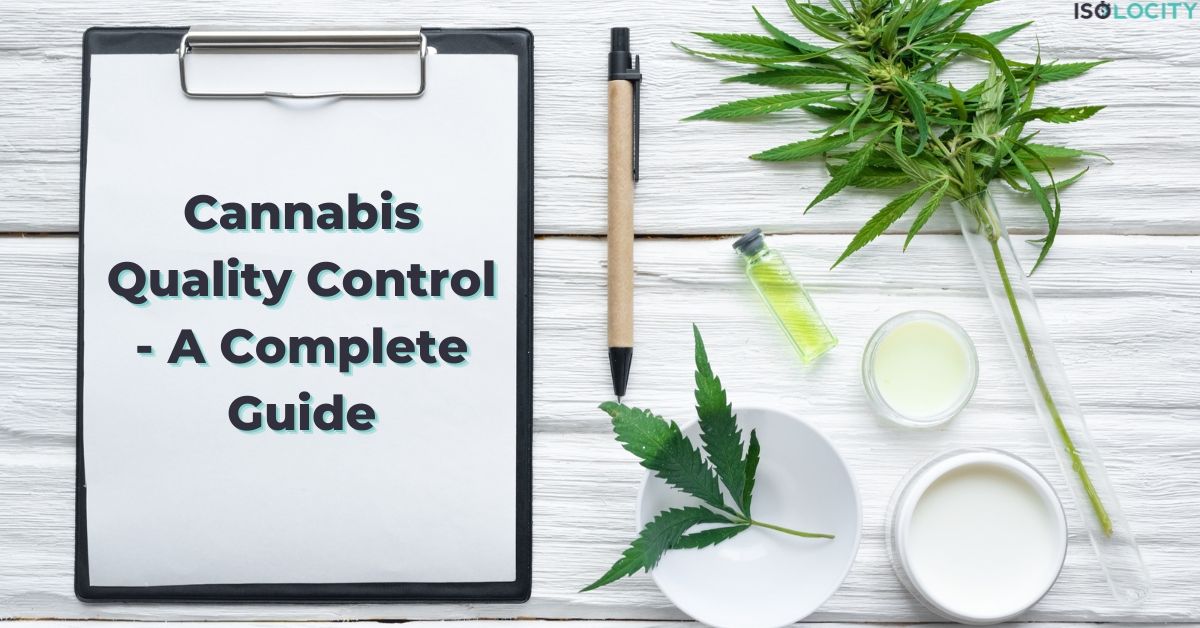The significance of cannabis quality control and assurance cannot be over-emphasized, especially for large-scale cannabis firms. Failure to comply with quality assurance testing can have serious repercussions. These repercussions include product recalls or seizures due to contamination or inappropriate pesticide application. Such incidents not only endanger customers, but may also result in significant financial losses for business owners. Furthermore, they can jeopardize their reputation and consumer trust.
Prefer Video Over Text? Watch This Video!
Why cannabis quality control is important
As the demand for high-potency THC grows, cannabis farmers are depending on testing laboratories more than ever. Given the possibility of pesticide reporting mistakes, it is critical to assure accurate findings. Additionally, profit-driven lab methods emphasize income over consumer health. Therefore, it is also critical to educate customers to ensure their awareness and understanding.
Testing laboratories must set a level of quality while serving their consumers, regardless of the less-than-ethical, yet enticing options.
- In a study researchers tested 20 different cannabis samples from dispensaries in California and found that 90% of the samples contained pesticides, fungicides, or other contaminants.
- In another study researchers found that over 80% of CBD products tested contained either more or less CBD than advertised, with some products containing no CBD at all.
Cannabis Quality Control Testing
In cannabis quality control testing, you carry out a series of tests and inspections at different stages of the production process.
Some of the most common tests include:
- Microbial testing: This involves testing for the presence of bacteria, fungi, and other microorganisms that can cause infections.
- Pesticide testing: This involves testing for the presence of pesticides and other chemicals that may have been used during the cultivation process.
- Heavy metal testing: This involves testing for the presence of heavy metals such as lead and arsenic, which can be harmful to human health.
- Potency testing: This involves testing the levels of cannabinoids such as THC and CBD in the product to ensure that it is consistent with the label claims.
- Residual solvent testing: This involves testing for the presence of solvents such as butane that may have been used during the extraction process.
Quality management system for cannabis quality control
Quality management systems are an essential component of any cannabis company’s operations, embedding quality assurance as an instinctive organizational norm. Companies must regulate cannabis products, like other consumables such as food and water, to protect customer safety.
Cannabis businesses with quality management processes can immediately detect potential problems. They can then take remedial action to avoid costly mistakes or product recalls. This is important for maintaining the quality of their products and protecting their reputation.
Quality management systems are critical for getting an advantage over competitors in a business as competitive as cannabis. Especially with the possibility of federal regulation looming in the not-so-distant future. Investing in quality control is not simply another expenditure. Implementing this eventually enhances corporate profitability. It also serves as a critical investment for the company. Such an investment can provide benefits even in a federally regulated environment.
Creating cannabis quality control methods
Creating quality control methods for cannabis goods is crucial. It ensures that the company’s quality control process is as automated, efficient, and consistent as feasible. You should consider the following points before designing the method.
- While developing QA SOPs, it is critical to consider state requirements, current corporate SOPs, and working with well-established and trustworthy laboratories.
- It is also critical to use resources to automate and improve QA operations, from document management to tracking shipments and recording problems.
Implementing cannabis quality control measures requires a systematic approach. The following steps can help guide the process:
- Establish quality control standards – The first step is to establish quality control standards that are consistent with local regulations.
- Conduct risk assessments – Conducting risk assessments can help identify potential hazards and risks associated with the production process.
- Develop standard operating procedures – Develop standard operating procedures (SOPs) that outline the steps involved in the production process and the quality control measures you need to implement.
- Train employees – Training employees on the SOPs and quality control measures are essential to ensure that they follow them consistently.
- Conduct regular audits – Conduct regular audits to ensure that you follow the quality control measures and to identify areas for improvement.
Implementing the cannabis quality control process
Firms that use ERP and quality management software to handle compliance and business operations may integrate cannabis quality control into the whole compliance process. It is vital to manage a seamless operation by utilizing a cannabis quality management software system. This system may assist in automating procedures, recording problems, monitoring, and tracking data. Taking stock of the compliance process is the first stage in preparing the organization for QC success. This step involves enhancing compliance practices, optimizing QC procedures, and aligning them to operate as an extension of the existing compliance process.
When integrating the QC process with compliance standards, it is critical to learn from different sectors. It is also essential to determine how to integrate GMP ideas on a scale that is appropriate for the organization. Elevating the compliance process with QC norms is critical, and it requires us to thoroughly document methods and develop accurate formulae that we can readily copy. Including employees, continuing education in the annual compliance plan is also a high focus. This plan provides an opportunity for staff to review best practices in food safety, product handling, and other areas.
Using quality management software that is GMP validated is also a good idea. Isolocity is a third-party GMP-validated quality management software that specializes in the cannabis industry.
Contact us today to learn more!
Blog Inspiration: Procanna-usa.com




